Overstaying in the Schengen Zone? Here’s How to Extend Your Schengen Visa
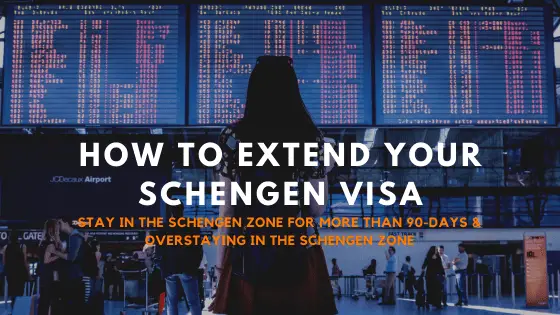 [su_spoiler title=”Contents In this Article” icon=”plus-circle”]
[su_spoiler title=”Contents In this Article” icon=”plus-circle”]
- What are the consequences of overstaying in the Schengen Area?
- How to Avoid Unintentionally Overstaying in the Schengen Area
- Extending a Schengen Visa
- What is the Processing Time for Visa Extension?
- What if you get stuck in the Schengen Zone?
- How to Stay in Europe for More Than 90 Days Legally
- Frequently Asked Questions About Schengen Visa Extension
So you are traveling across the Schengen States, or one of the Schengen Countries in particular, and find yourself falling for the culture, scenery, music, and people and a tempting idea pops into your head of whether you can stay longer than the allowed duration of your visa. Before you entertain this appealing thought, you should know the consequences of intentional or unintentional overstaying short-term visas. We will also talk about how to avoid overstaying altogether.
What are the consequences of overstaying in the Schengen Area?
First thing first, you need to know that your entry and exit to each Schengen Member State is recorded and shared among the Schengen countries.
Overstaying the allowed time of your visa is an offence that will warrant a fine, being booted back to your country of origin, or worse being banned from entering the Schengen area
Although there is no common policy for all Schengen Member States regarding overstaying penalties, each of the individual states applies different types of sanctions. For this reason, the consequences of overstaying in the Schengen territory varies greatly on the number of days you have overstayed and the country you get caught in Germany, the Netherlands, Poland, Switzerland, and Scandinavian countries are all very strict about entry and exit while Greece is known for applying very high fines to those caught overstaying in the Schengen zone.
Here are the general penalties enforced by the Schengen Member States for overstaying.
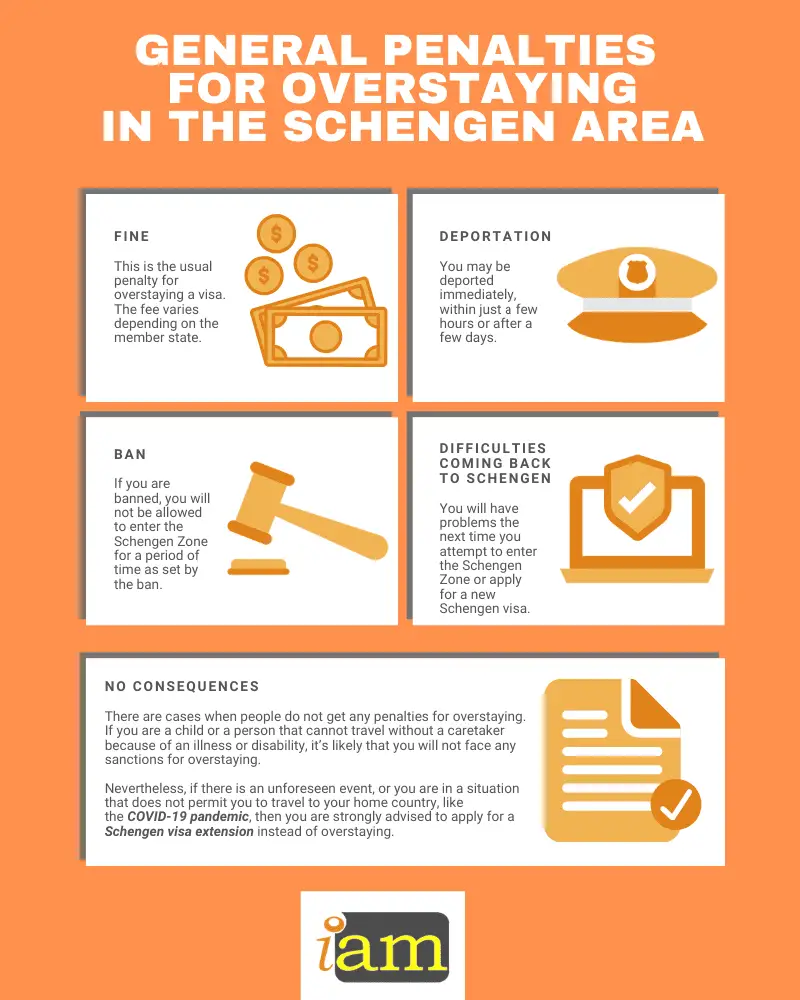
Fine
This is the usual penalty for overstaying a visa. The fee varies depending on the member state. Additionally, If you are caught overstaying your welcome for a month or so then you will also be banned from entering the Schengen Area for a specific period of time.
Deportation
When you get caught staying illegally in a Schengen Area, you will be deported to your home country. You may be deported immediately, within just a few hours or after a few days.
Deportation is always usually followed by another consequence that will be communicated to you before being deported. If you've overstayed for a few days and you are lucky enough to be caught in one of the countries that do not mind overstayers, you may leave without any penalty or adverse effect.
Ban
If you are banned, you will not be allowed to enter the Schengen Zone for a period of time as set by the ban. This usually happens due to you overstaying, working when not permitted or engaging in other illegal activities. You can be banned for a period of three years or more.
Difficulties coming back to Schengen
As previously mentioned, the database records are shared by the Schengen countries so even if you get back to your home country without any fine or ban, you should know that your overstaying in the Schengen zone will cause you problems the next time you attempt to enter the Schengen Zone or apply for a new Schengen visa. Immigration officers and border patrol tend to be suspicious of people who overstay even once; no matter in which country they were caught overstaying.
No consequences for overstaying in the Schengen zone
There are also cases when people do not get any penalties for overstaying. If you are a child or a person that cannot travel without a caretaker because of an illness or disability, then it's likely that you will not face any sanctions for overstaying.
Nevertheless, if there is an unforeseen event, or you are in a situation that does not permit you to travel to your home country, like the COVID-19 pandemic, then you are strongly advised to apply for a Schengen visa extension instead of overstaying.
How to Avoid Unintentionally Overstaying in the Schengen Area
There are people that unintentionally overstay their visas. To avoid unintentionally overstaying in the Schengen zone, you need to know how to count your 90/180 days and check the period of time you are allowed to stay in the member states combined. This information can be found in your Schengen visa sticker.
If you think you need more time in the Schengen area, and have a strong reason for doing so, apply for your extension right away to avoid overstaying.
What does 90 days within 180 days mean?
For short term Schengen visas, people commonly misunderstand the 90 days in 180 days (6 months) rule of Schengen Visa. Some sources state “On the 181st day, the clock is reset and you are in a new 180-day calendar“… this is wrong! It does not reset.
To calculate the 90 days visa-free period, you should always count the last 180 days and check if you have been in Europe for longer than 90 days within those 6 months. On the 181st day, you need to count backwards another 180 days and check if you have been in the Schengen zone for more than 90 days.
Bear in mind that the first day you enter the Schengen territory is counted as day 1 even if it is just before midnight, while the date you leave is counted as the last day even if you left before sunrise.
Counting the days you spent in the Schengen Area can be confusing, but it is important to keep track of how long you have stayed in the Schengen Area to avoid overstaying and facing the penalties for doing so. This is why we have created a free tool, 90/180 Day Rule Schengen Calculator: Free Schengen Zone Stay Calculator to help travellers like you! Check it out to get an accurate calculation of the days you have spent in the Schengen zone and how long you have left!
When to Apply for a Short-Stay Visa Extension?
It is very important to apply on time, which is before the expiration of your visa. If you apply after your visa expires, even just a day later, then you will be deported for overstaying your visa, despite your reasons. You should apply at least a week before your current Schengen short-stay visa expires.
How Long is Your Schengen Visa Valid For?
People are also confused with the validity and duration of the Schengen Visa. A Schengen visa validity is the date from which the visa holder is permitted to enter the Schengen Area and the duration of stay is the number of days that you can spend within that period. This information can also be found on the visa sticker on your passport.
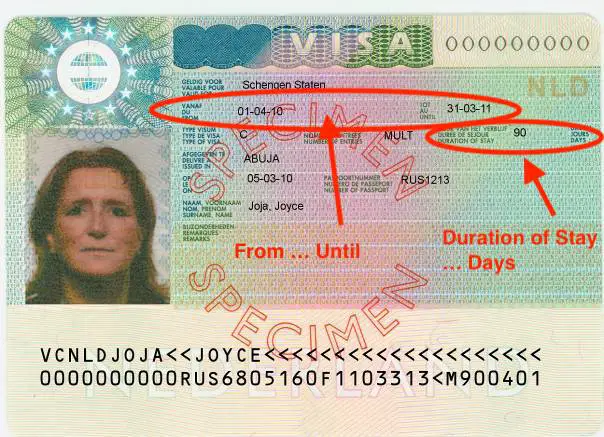
The DURATION OF STAY…DAYS is the number of days you can stay in the Schengen area. These days are the 90 visa-free days that you are permitted to stay in the Schengen zone within the last 180 days. It is counted from the date you enter the Schengen area (you will get an entry stamp) to the date you exit the Schengen area (the exit stamp). The entry date and exit date are also counted and included in the calculation.
The days between “FROM …UNTIL” is usually longer than the “DURATION OF STAY“. This is to give you the flexibility to plan your entry into and exit from the Schengen area.
Your stay in the Schengen area must never exceed the exact number of days in the “DURATION OF STAY …DAYS“.
You must also leave no later than the date printed in the “UNTIL” field.” If the days FROM…UNTIL is less than 90 days, you can extend this visa for personal circumstances.
If you think that you will not be penalised just because you stayed after your visa expired without knowing, you are wrong. It is your responsibility as a traveller to a foreign land to check how long you are permitted to stay in the Schengen Zone. So you should think twice and be a smart traveller and don't jeopardise the effort you exhausted when you applied for the Schengen Visa.
Extending a visa beyond the 90 days visa free Schengen travel
Do you find yourself stuck in a Schengen Area due to flight restrictions and travel bans imposed because of Coronavirus or any unforeseen events? Well, it is critical not to overstay your visa as it may be a cause for disqualification on your next visa application.
If you find that your visa is running out and you have an exceptional reason to stay in the Schengen Area then you have to apply for a Schengen visa extension. Although it is hard to request for an extension, it is not impossible to extend a short-stay Schengen visa so long as you have a very strong reason and have proof to support your claim.
Schengen visa types and validity
Check the visa type and validity of your Schengen visa to determine whether you need an extension or not.
Single Entry – you will have a limited amount of days to remain in Schengen member state, and after you leave you have no right to go back
Double Entry – same policy as above mentioned, however you are allowed to enter the Schengen Area twice.
Multiple Entries – you can enter any of the Schengen member states as many times as you wish, for as long that you do not exceed the 3 months limit within a six months period.
What are acceptable reasons to extend a Schengen short-stay visa?
According to the Schengen visa policy, acceptable reasons to extend a Schengen short-stay visa are only: force majeure, late entry, humanitarian reasons, and important personal reasons.
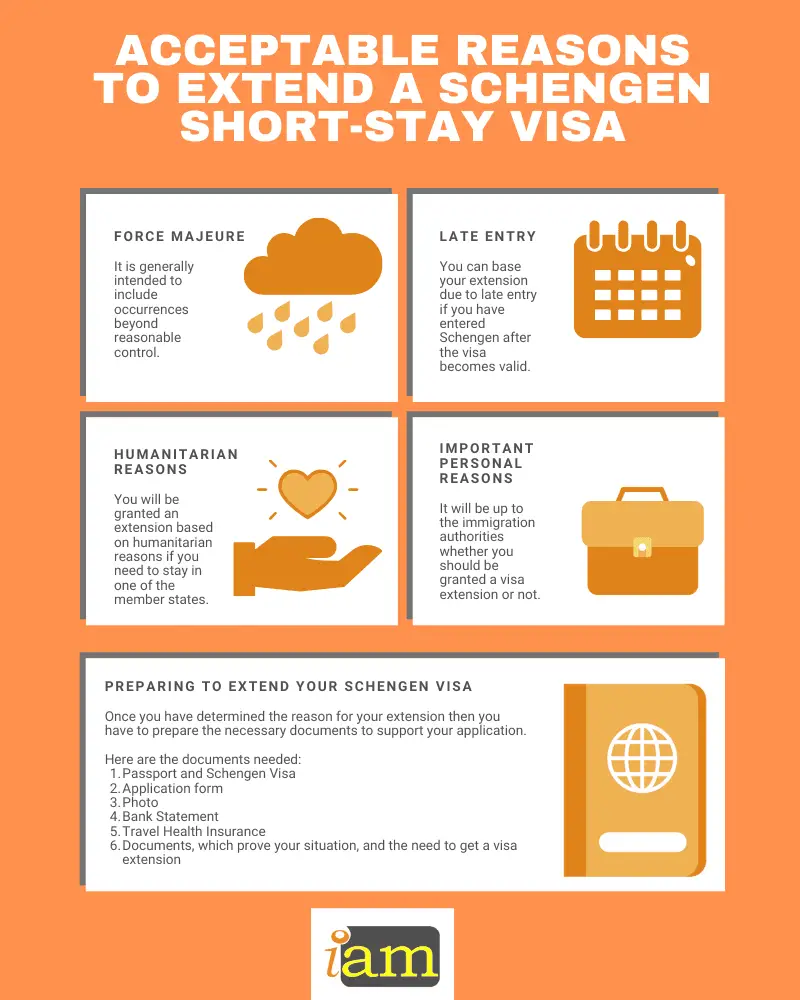
Force Majeure
It is generally intended to include occurrences beyond reasonable control. For instance, something unpredictable happened all of the sudden in your home country prior to your visa expiration, as a conflict or war, or even violent protests across the country, extreme weather conditions, no flight connections for reasons beyond your control, then you have a good chance to get a Schengen short-stay visa extension. You will be granted an extension of a few weeks, or until the situation in your home country changes. If the situation does not change, you will have to apply once again for a short-stay visa renewal, in order to remain in Schengen.
Late Entry
This can be used for a single-entry short-stay visa.
You can base your extension due to late entry if you have entered Schengen after the visa becomes valid. For example, your visa became valid on March 1, but you entered a Schengen state on March 15.
Humanitarian Reasons
You will be granted with a short-stay visa extension based on humanitarian reasons if you need to stay in one of the member states to continue receiving medical treatment, to take part in the funeral after the sudden death of a family member, to give support to a person close to you who is going through some kind of hardship.
Important Personal Reasons
You will have a lesser chance of getting an extension but your reason does not fall on the above categories. For example, you have unfinished business in one of the Schengen Member State, an unplanned wedding, etc. It will be up to the immigration authorities whether you should be granted a visa extension or not.
Preparing to Extend Your Schengen Visa
Once you have determined the reason for your extension then you have to prepare the necessary documents to support your application.
What are the documents required to extend a Schengen visa?
- Passport, which must have the current visa under which you entered the Schengen
- Application form, for a short-stay Schengen visa extension
- One photo, which fulfills all the criteria and visa photo requirements.
- Proof of Income, which shows you can financially maintain yourself during the period you have applied to get a visa extension for
- Travel Health Insurance that covers the whole Schengen Area as well as the whole period which you have applied to extend your visa for
- Documents, which prove your situation, and the need to get a visa extension
Where to Apply to Extend a Schengen Visa?
It depends on the Member State you are currently residing in. It is crucial to know that you need to remain in the country where you requested an extension. It would take a few days to a month to process your application and you are permitted to remain even if your visa expired but you are not allowed to travel to another member state.
What is the Schengen Short-Stay Visa Extension Fee?
Applying for a visa extension has a separate fee and would depend on your reason for staying. If you have already extended your visa once and still need to stay for whatever reason, the cost of the second Schengen visa extension fee depends on the age of the applicant.
First Visa Extension Fee
If this is the first time you are applying for a Schengen short-stay visa extension, then you will not have to pay any fee if your application is based on the following reasons:
- humanitarian reasons
- majeure reasons
Whereas, you will have to pay a fee of 30 euros, if you have based your application on one of the following reasons:
- important personal reasons
- due to late entry
Second Visa Extension Fee
If you have already extended your visa once, but you need to extend it once again, for whatever reasons, then you will have to pay a fee. The cost of the second Schengen visa extension fee depends on the age of the applicant as follows:
- Minors need to pay a fee of 30 euros
- Adults have to pay a fee of 60 euros
Just as when applying for a regular Schengen visa, if your request for an extension is rejected, you will not get your money back.
What is the processing time for a visa extension?
Usually, your visa extension application can take a few days, up to a month to be processed by the relevant authorities. During this time, you are permitted to remain in the country where you submitted your application even after your visa expires, but not to travel to the other Schengen countries.
If you are granted a visa you will be able to remain, while if you do not you will have one or two days to leave.
What if you get stuck in the Schengen Zone?
The European Union has issued European Guidance on Schengen visas & COVID-19-Related Travel Bans and Solutions for Overstaying in the Schengen zone under EU communication (2020/C 102 I/02).

If you are a visa holder and are present in the Schengen area but cannot leave at the expiry of your short-stay visa, you have the ability to extend your Schengen visa for up to a maximum stay of 90/180 days by the designated Member States authorities.
If you hold a visa and need to stay beyond the extended period of 90/180 days, a long-stay visa or a temporary residence permit should be issued by the competent national authority that you are currently stuck in. This means that if you are currently stuck in Spain, for example, the Spanish government should give you a Spanish residence permit.
For visa-waived third-country nationals, like US nationals, Australians etc, who need to stay beyond the extended 90/180 days, a national long-stay visa or a temporary residence permit should also be issued by the national authorities.
Member State countries are being encouraged to waive administrative sanctions or penalties on third-countries nationals unable to leave their country due to travel restrictions.
Additionally, overstaying because of the current coronavirus travel restrictions should not be considered when you are next processing any future visa applications.
The EU guidance includes the following key points:
- Visa-exempt nationals. If you overstay your 90 days visa free Schengen of allowable stay out of 180 day timeframe, you should be able to apply for a long-term national visa or temporary national residence permit where you are currently stuck.
- Visa nationals. You should be able to first apply for a 90-day Schengen visa extension based on force majeure (unforeseen circumstances). Once the 90 days are running out, you should be able to apply for a long-term national visa or temporary national residence permit.
- Waiving of sanctions. EU countries are urged to waive sanctions or penalties for overstaying in the Schengen zone and should disregard current overstays for future visa or residence applications.
- Minimum visa service. EU countries should continue offering minimum visa processing service and assistance for those exempt from the travel ban.
- Essential travel. Member states should remind visa holders that they must justify their purpose of travel when seeking entry into the European Union.
Despite the EU guidance, there seem to be differences in the implementation between EU countries. You are therefore advised to clearly document your purpose of travel to prevent entry and re-entry issues.
How to Stay in Europe for More Than 90 Days Legally
For visa-exempt nationals and those of you touring Europe for prolonged periods, or if you are just curious (and just asking for a friend), the question of whether it is possible to stay in Europe for longer than 90 days legally.
Well, there is. If you hold a Schengen visa or are exempt, you can stay in Europe for longer if you plan well. It involves obtaining visas to countries like the UK and Ireland and possibly other countries in Europe as your time resets. You can then get a further 90 days visa-free Schengen travel.

Frequently Asked Questions About Schengen Visa Extension
Can a Schengen tourist visa be extended?
Yes, but you will need to have a strong reason for doing so that falls within the acceptable reasons for extension: force majeure, late entry, humanitarian reasons, and important personal reasons.
What happens if you overstay your Schengen visa?
You can face penalties like a fine, deportation, being banned from entering the Schengen area in the future, and difficulties having your future applications accepted. These will vary depending on the severity, as well as which country you are overstaying in. Some countries are much stricter than others.
Can I get a multiple entry Schengen visa?
Yes, but it depends on a few factors. You will need to convince the embassy through your application and your interview of your need for such a visa, as well as give supporting documents, including proof that you will be able to support yourself financially through these trips.
Which Schengen visa is longest?
You can get a multiple entry visa of up to 5 years. But keep in mind that you still need to follow the 90/180 rule.
Which is the easiest country to get a Schengen visa?
Lithuania, Estonia, Finland, Iceland, Latvia, and Poland have some of the highest visa acceptance rates in the Schengen area.
Alternately, Belgium, Malta, France, Sweden, Portugal and Norway have some of the highest visa rejection rates in the Schengen area, although the visa acceptance rates in these countries still range around 83-91% acceptance.
Just remember that you need to prepare your application properly and ace your visa interview in order to get the highest chance of visa acceptance. And, if you have any doubts, we can always do your application for you!
If you are stuck in a Schengen country, need to extend, or want to find out the best way to reset your travel allowance, we would love to hear from you.
If you also have a story on extending your Schengen visa or have ideas on how to extend it, leave a comment below.
IaM can help with your visa application to the United States, the UK & other countries
If you need help with a US visa, a UK Visa, or visa to Europe, including help with appointment booking obligations, IaM can help. For more information and advice on US immigration, UK immigration law and US visa applications or if you need any help or assistance please, reach out to your Visa Coordinator at IaM.
- Cyprus Set to Join Schengen Area in 2026 - 14 May 2025
- UK To Cut Graduate Visa from 2 Years to 18 Months - 13 May 2025
- US Travellers Warned: Stay Alert in the UK - 12 May 2025




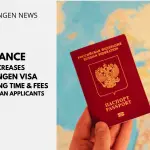





4 Responses
Hi! I have overstayd in Denmark in one year and i need to leave. But i dont want to get bannet from enter the Schengen zone, i want just to pay a fine.
So question is which country can i leave from and have a low fine to pay. I can leave from any country in the Schengen zone. So which country is the easy to leave from?
Overstaying in the Schengen zone can lead to serious consequences, including fines and entry bans. However, the outcome will largely depend on the country you exit from and how authorities handle your specific case. Each Schengen country has its own approach to dealing with overstays, but unfortunately, there is no guarantee that you will be able to avoid a ban simply by paying a fine.
Generally speaking, overstays are reviewed at the border, and many countries follow EU-wide regulations for entry bans. However, in some cases, fines or warnings may be issued instead of a ban, especially if this is your first overstay and you have not violated other laws.
It’s important to note that any Schengen country could potentially issue a ban or fine, and attempting to find the “easiest” country to leave from can be risky. Your best course of action is to leave the Schengen zone as soon as possible to avoid worsening the situation.
I have provided 2 short stay plans in Italy to the embassy proving all the documents with a clear description in the cover letter. I have been given a single-entry visa with 2 days permit to stay. Can I debate for an extension?
Hi Aparna,
Unfortunately, debating for an extension after a visa has been issued is generally difficult unless there are exceptional circumstances. Schengen visas are typically not extended unless you face serious issues such as unforeseen medical reasons, urgent humanitarian grounds, or force majeure events (e.g., extreme weather, strikes affecting travel).
However, if you believe you have valid reasons to request an extension, you could apply for it while in-country at the local immigration authorities in Italy. You will need to present strong evidence justifying the extension beyond your original visa dates. It’s important to act quickly, as any application must be made before your current visa expires.